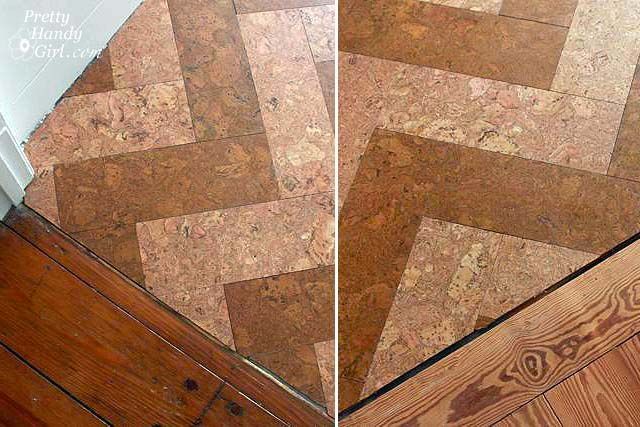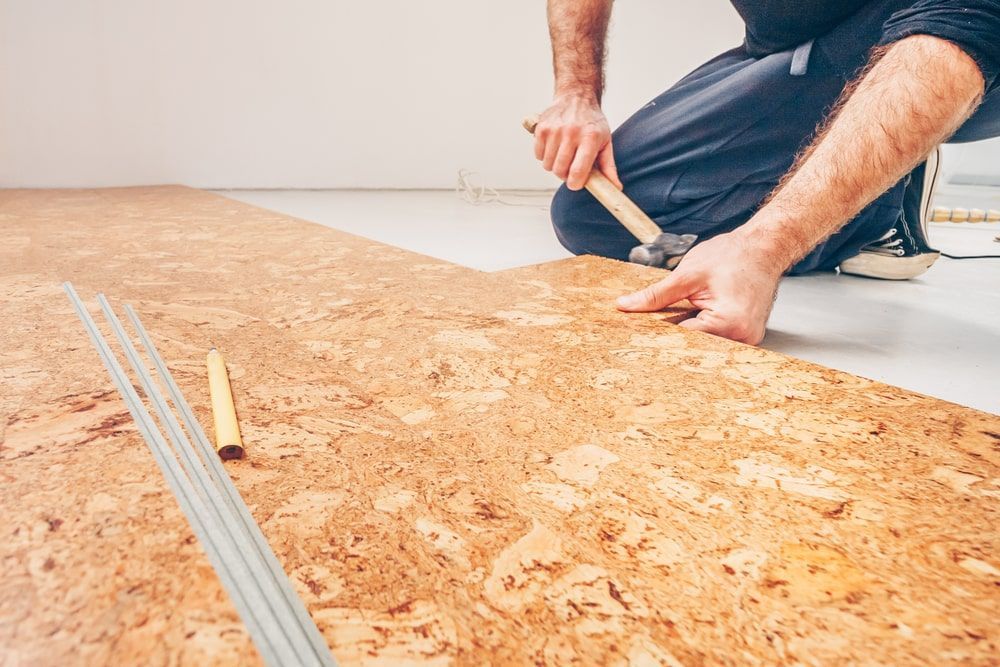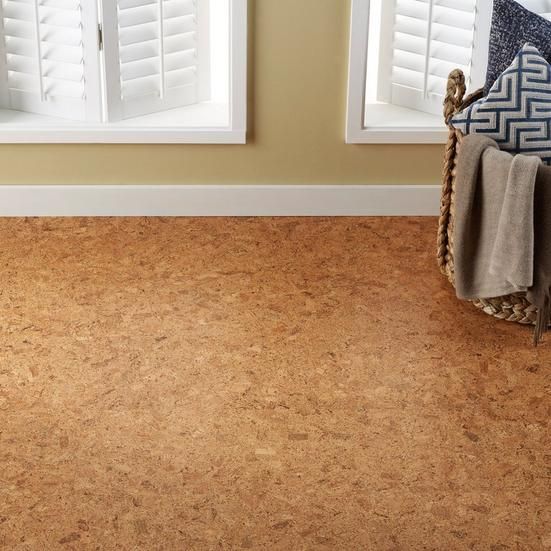Cork Flooring Replacement in Nashville, TN
. Our experienced team handles everything from removal of your existing flooring to perfect installation of premium cork materials, ensuring minimal disruption to your daily life.
Cork flooring has gained popularity for good reason - it's naturally antimicrobial, provides excellent insulation, and absorbs sound better than many alternatives. If your current cork floors are showing signs of wear or you're considering upgrading from another material, you'll appreciate our comprehensive approach to replacement. We source only the highest quality cork materials that stand up to Nashville's climate variations while providing the warmth and resilience your home deserves.
We understand that replacing flooring is a significant investment in your property. That's why our cork flooring replacement service includes detailed consultations where we assess your specific needs, provide transparent pricing, and establish realistic timelines. You can count on Nashville Flooring Company to deliver beautiful results that enhance your home's value and your daily comfort for years to come.
Why Choose Cork Flooring?
Cork flooring offers exceptional benefits including sustainability, eco-friendliness, and natural insulation properties that make it an ideal choice for environmentally conscious homeowners.
Sustainable Floor Option
Cork flooring stands out as one of the most sustainable options available in today's market. The material comes from the bark of cork oak trees, which regenerates approximately every nine years without harming the tree. This renewable harvesting process allows the trees to live for up to 300 years while providing multiple harvests throughout their lifetime.
We source our cork flooring materials from responsibly managed forests where harvesting follows strict ecological guidelines. The longevity of cork flooring also contributes to its sustainability profile. With proper maintenance, cork floors can last 25-30 years, reducing the need for frequent replacements and minimizing resource consumption.
Unlike other flooring options that require the destruction of trees, cork harvesting preserves the forest ecosystem while providing a living wage for workers in cork-producing regions.

Eco-Friendly Flooring
Cork flooring ranks among the most eco-friendly building materials available today. The manufacturing process for cork flooring produces minimal waste as virtually every part of the harvested bark is utilized. Even cork dust created during production becomes fuel for the manufacturing facilities.
You'll appreciate that our cork flooring contains no harmful volatile organic compounds (VOCs), helping maintain healthy indoor air quality in your home. Cork also naturally resists mold, mildew, and termites without chemical treatments.
The biodegradable nature of cork means that at the end of its lifecycle, it won't contribute to landfill problems. Many of our cork flooring options also feature water-based finishes and adhesives that further reduce environmental impact.
Cork's natural fire-resistant properties provide additional safety benefits without the need for chemical flame retardants.

Cork's cellular structure gives it exceptional insulation capabilities that benefit your home in multiple ways. The tiny air cells in cork create natural thermal insulation that helps maintain comfortable room temperatures year-round. You can expect to save on energy costs as cork flooring helps keep warmth in during winter and heat out during summer.
We've found that cork's acoustic insulation properties make it particularly popular for multi-level homes and apartments. Cork absorbs sound vibrations rather than reflecting them, creating a quieter living environment.
The natural springiness of cork provides comfort underfoot that reduces fatigue when standing for long periods. This elasticity also means dropped items are less likely to break when falling on cork flooring.
Natural Insulation Properties
Types of Cork Flooring
Cork flooring comes in several distinct varieties, each with unique installation methods and aesthetic features. Understanding these different types can help you select the best option for your home's specific needs and design preferences.
Customer-Centric Approach
Floating Cork Floors
Floating cork floors are among our most popular options because they don't require adhesives during installation. These floors feature interlocking edges that fit together like puzzle pieces, creating a stable surface that "floats" over the subfloor. This design allows for natural expansion and contraction with temperature changes.
We've found that homeowners particularly appreciate how easy these floors are to install, making them perfect for DIY projects. The cork planks typically include a wear layer that enhances durability and protects against scratches and stains.
Glue-Down Cork Tiles
Glue-down cork tiles offer exceptional versatility in design and pattern creation. These tiles require adhesive for installation, creating a permanent bond with your subfloor. The result is an extremely stable floor with minimal movement.
Our glue-down tiles come in various shapes and sizes, ranging from traditional squares to modern rectangular formats. You can arrange them in countless patterns including herringbone, basket weave, or random layouts for a truly customized look.
Engineered Cork Flooring
Engineered cork flooring represents the perfect marriage between traditional cork and modern flooring technology. These products feature a layer of cork veneer bonded to a stable core, typically made of high-density fiberboard or plywood.
We recommend engineered cork for areas with more extreme temperature fluctuations or mild moisture concerns. The layered construction prevents the warping and dimensional changes that can affect solid cork products.
Cork Flooring Installation Process
Our installation process ensures your cork flooring is properly placed for maximum durability and aesthetic appeal. We offer various installation methods to suit different needs and skill levels.
Professional Cork Installers
Our installers have completed numerous cork projects throughout Nashville and surrounding areas, bringing expertise to every job. We begin with a thorough assessment of your subfloor to ensure it's level, clean, and dry. This critical step prevents future issues like buckling or uneven wear.
Our team handles all the technical aspects including proper acclimation of materials, precise cutting around obstacles, and applying the right adhesives when needed. We use specialized tools to ensure tight seams and proper expansion gaps.
DIY Cork Flooring
If you're considering installing cork flooring yourself, we offer comprehensive DIY cork tile kits with everything you need. These kits include detailed instructions, proper adhesives, and cutting tools. Before starting, you should acclimate your cork materials in the installation room for 48-72 hours. This helps prevent expansion or contraction issues after installation.
Your subfloor preparation is crucial. It must be completely level, clean, and dry. Any imperfections will show through the cork tiles over time. We recommend using a high-quality cork-specific adhesive for glue-down applications. Apply it evenly with the proper trowel size to ensure strong adhesion without excess.
Cork Floating Installation
Floating cork floor systems represent the easiest installation method for many homeowners. These click-together planks eliminate the need for adhesives and can be installed directly over many existing floors. Our cork floating floors feature robust locking mechanisms that create tight seams and a unified surface. The built-in underlayment provides additional sound absorption and comfort underfoot.
You'll need to maintain a proper expansion gap around the perimeter of the room, typically 1/4 to 1/2 inch. This accommodates the natural expansion and contraction of cork with humidity changes. Installation progresses row by row, with planks staggered for structural integrity and visual appeal. The final row often requires precise cutting to fit the remaining space properly.
Cork Floor Maintenance
Cork flooring requires regular but simple maintenance to preserve its beauty. We recommend daily sweeping or vacuuming with a soft brush attachment to remove dirt and debris that could scratch the surface. For weekly cleaning, use a damp mop with a mild soap solution specifically formulated for cork floors.
Avoid using harsh chemicals, ammonia-based cleaners, or abrasive tools that can damage the protective finish. Place protective pads under furniture legs to prevent dents and scratches. Maintain indoor humidity levels between 30-60% to prevent excessive expansion or contraction of your cork floors.
Request Your Free Quote Today
Transform your home with sustainable flooring options today! Our flooring solutions are ready to bring beauty, durability, and environmental responsibility to your Nashville home.
Call us at (615) 555-7890 to schedule your free in-home consultation. Our flooring experts will bring samples directly to you, making it easy to visualize how each option will look in your space.
Request your free quote today! Complete our simple online form, and we'll respond within one business day with pricing options tailored to your specific needs.

